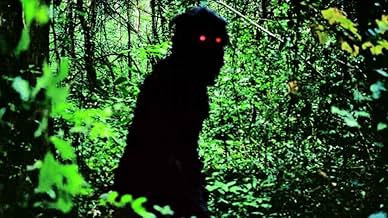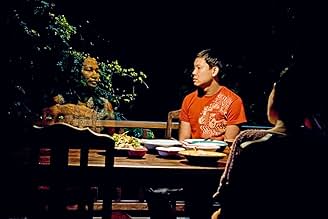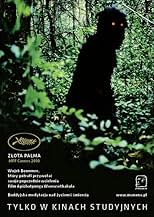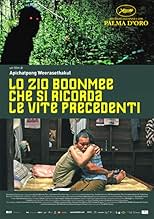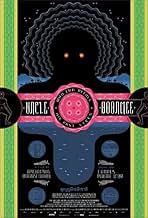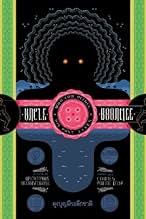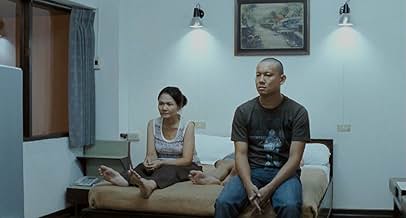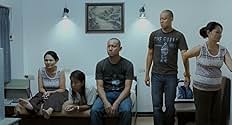Oncle Boonmee (celui qui se souvient de ses vies antérieures)
Original title: Loong Boonmee raleuk chat
- 2010
- Tous publics
- 1h 54m
IMDb RATING
6.7/10
18K
YOUR RATING
Dying of kidney disease, a man spends his last, somber days with family, including the ghost of his wife and a forest spirit who used to be his son, on a rural northern Thailand farm.Dying of kidney disease, a man spends his last, somber days with family, including the ghost of his wife and a forest spirit who used to be his son, on a rural northern Thailand farm.Dying of kidney disease, a man spends his last, somber days with family, including the ghost of his wife and a forest spirit who used to be his son, on a rural northern Thailand farm.
- Director
- Writers
- Stars
- Awards
- 11 wins & 25 nominations total
Kanokporn Tongaram
- Roong
- (as Kanokporn Thongaram)
- …
- Director
- Writers
- All cast & crew
- Production, box office & more at IMDbPro
Featured reviews
For those who have not heard of Thai filmmaker and artist Apichatpong Weerasethakul, I guess you must have heard of his latest film Uncle Boonmee Who Can Recall His Past Lives, winning the Palme d'Or at last year's Cannes Film Festival, and being the first Southeast Asian director to do so. That should interest you to take that leap of faith to experience the coming of Uncle Boonmee yourself, and that feeling of being frustrated yet enthralled, fascinated yet perplexed, all at the same time, fighting to stay engaged, and making sense of the visuals flitting around dreamscapes.
This film is like a diamond with many different cuts made to make it shine, each representing a facet from which you can choose to look at, or interpret from. Like a prism which dissipates light shone on it, your take on this film will likely be entirely different from mine, and what more, you'll probably have different takes on each of the different aspects of the film, since the scenes that make it up are as disparate as can be. It makes the film going experience a little more interesting since it's open, and never crystal clear given the takeaways for one based on one's journey in life thus far.
At its crux, the story is exactly that of its title, where we see Uncle Boonmee (Thanapat Saisaymar) living the last days of his life with kidney failure, choosing like most Asians do with the preference to live out the last days at the comfort of one's home, rather than at a sterile hospital. It is said that those on the death bed will see their life flash pass their eyes, but for Uncle Boonmee, his plodding walk toward the light at the end of the tunnel, means giving the film a lot more exploratory path to tread on, with a look at what his past lives were as well, ranging from the suggested buffalo, to even a member of the aristocracy (and that much talked about scene with the catfish. Hmm... maybe he could be the catfish too!)
Things get a lot stranger of course, even as it seems that Boonmee can remember his previous lives before reincarnation. As far as my limited grasp of that process goes, one has to drink up a liquid that will make you forget what you've gone through, and one's karma accumulation has bearings on what next you'll be incarnated, with the human form being quite OK, rather than an animal. I suppose Boonmee in his previous life did OK to be reincarnated as a human in this life, and in his last days get visited by his late wife (Natthakarn Aphaiwonk) with whom he shares a poignant, heart-wrenching scene with, and also a visit from his son (Geerasak Kulhong behind heavy makeup), whom you'd have already have an idea of from the various promotional material, and no, he's not captured in a picture just because the camera did not have an anti-red eye function.
Don't be shy if you don't understand the film. For starters, I suppose any film based on dreams and fantasy opens itself up to a lot of leeway in interpretation, and not taking everything verbatim, verbose or literal. Even the auteur himself has said that you "don't need to understand everything" in an interview with The Guardian, probably a relief for those like me who emerged from the screening with more questions than to know where to begin asking them. Like most art films, this one moves at a leisurely pace, and is filled with plenty of art house sensibilities and techniques, and while I won't say will reward the patient viewer, it will challenge you to think through about what you've just seen, and I felt it was easier to make sense of individual scenes, than as a whole when trying to fit the jigsaw in a coherent fashion.
To paraphrase Bruce Lee, this film is like water, having no form of its own, yet taking up form based on the viewer's individual experience and interpretation. I guess that's what makes Uncle Boonmee unique, coming from a filmmaker who's bold to conceptualize this piece of art that works itself through different strokes for different folks.
This film is like a diamond with many different cuts made to make it shine, each representing a facet from which you can choose to look at, or interpret from. Like a prism which dissipates light shone on it, your take on this film will likely be entirely different from mine, and what more, you'll probably have different takes on each of the different aspects of the film, since the scenes that make it up are as disparate as can be. It makes the film going experience a little more interesting since it's open, and never crystal clear given the takeaways for one based on one's journey in life thus far.
At its crux, the story is exactly that of its title, where we see Uncle Boonmee (Thanapat Saisaymar) living the last days of his life with kidney failure, choosing like most Asians do with the preference to live out the last days at the comfort of one's home, rather than at a sterile hospital. It is said that those on the death bed will see their life flash pass their eyes, but for Uncle Boonmee, his plodding walk toward the light at the end of the tunnel, means giving the film a lot more exploratory path to tread on, with a look at what his past lives were as well, ranging from the suggested buffalo, to even a member of the aristocracy (and that much talked about scene with the catfish. Hmm... maybe he could be the catfish too!)
Things get a lot stranger of course, even as it seems that Boonmee can remember his previous lives before reincarnation. As far as my limited grasp of that process goes, one has to drink up a liquid that will make you forget what you've gone through, and one's karma accumulation has bearings on what next you'll be incarnated, with the human form being quite OK, rather than an animal. I suppose Boonmee in his previous life did OK to be reincarnated as a human in this life, and in his last days get visited by his late wife (Natthakarn Aphaiwonk) with whom he shares a poignant, heart-wrenching scene with, and also a visit from his son (Geerasak Kulhong behind heavy makeup), whom you'd have already have an idea of from the various promotional material, and no, he's not captured in a picture just because the camera did not have an anti-red eye function.
Don't be shy if you don't understand the film. For starters, I suppose any film based on dreams and fantasy opens itself up to a lot of leeway in interpretation, and not taking everything verbatim, verbose or literal. Even the auteur himself has said that you "don't need to understand everything" in an interview with The Guardian, probably a relief for those like me who emerged from the screening with more questions than to know where to begin asking them. Like most art films, this one moves at a leisurely pace, and is filled with plenty of art house sensibilities and techniques, and while I won't say will reward the patient viewer, it will challenge you to think through about what you've just seen, and I felt it was easier to make sense of individual scenes, than as a whole when trying to fit the jigsaw in a coherent fashion.
To paraphrase Bruce Lee, this film is like water, having no form of its own, yet taking up form based on the viewer's individual experience and interpretation. I guess that's what makes Uncle Boonmee unique, coming from a filmmaker who's bold to conceptualize this piece of art that works itself through different strokes for different folks.
I really do wish I could like this. As it is, I think it has some dazzling sequences, and some really atmospheric and hypnotizing scenes. For the most part though, it didn't amount to much for me, and that's because I was just really bored by a lot of it. This really just comes down to whether one is hypnotized or bored by it, and unfortunately for me it was the latter. That doesn't mean that it's an awful film, it has way too much originality in what I saw to label it as such (and whether it has anything to really say is anyone's guess). Still, I wouldn't recommend this to most people, simply because it's so hard to get into. Not recommended.
This movie is meditation, a state of concentration. I only wish I wasn't tired when I saw it last night because my concentration waned, I could feel the movie slipping between my fingers and trying to wilfully sustain the experience can't work. This is a Buddhist film, but it's Thai Buddhist (the form they practice in Thailand came from Sri Lanka and is from the earliest strata of Buddhism), it's spiritual but it's not esoteric in the manner of the Tibetans, ancient but not arcane. It's not Buddhist because Boonmee may or may not be recalling on his deathbed his past and future lives, or because there are ghosts and demons and a talking catfish, this is colorful lore, the illusory flowers of mind. It's Buddhist because it's aware of the moment. Not so strangely, it's the fantastical bits that seem to make the film watchable for most people, yet if we come to this film to satisfy our need for something to happen, we break the spell. The spell here for me is the awareness of life as is, the clear vision of a heaven in the present world.
Here's a camera that doesn't describe a world, it allows it to emerge in its own time. Sometimes this tests my patience but I appreciate that it doesn't make amends and concessions. Cessation, stillness of mind, true perception, these are all vital and desirable here, and they can only happen in their own time, they can't be forced. I appreciate that and I appreciate the limitations of my own viewing. In those moments that my eyes and the movie adjust, I am blissful. Two moments exemplify this, the one is a table out in the verandah by night, insects buzzing around a light and everything is quiet, this is the summer night for me. The other is Uncle Boonmee lying down on a bed in his honeykeeping shed, it's noon and crickets are humming from the trees, this is the summer day. It reminds me of the remembrance of spring in Kiarostami's The Wind Will Carry Us.
The finale is rather interesting, despite the above. A lot of viewers seem to regard it as Weeresethakul's comment on the alienation fostered by the niceties of modern society. It is its own comment on the place of Buddhism in one such society, where the garments of the monk mean nothing, but instead of inferring that a day's hard work out in the open is preferable to watching TV Weeresethakul could have not made a movie to begin with (that calls for us to sit alone from one another in a dark room where flickering lights are projected).
But I don't think that such a simple conclusion was what was intended. I see vision that wants to encompass the world of ambiguities. The family may be sitting in the silent, staring at a box, but I got the sense of quiet warmth coming from the simple togetherness, a certain soothing affect that is possible only in people who can sit together without a need for words. Who can relax simply in the presence of each other.
This is valuable work, and I believe it will be cherished by viewers who feel the chakras of cinema should be purified and set ablaze now and then.
Here's a camera that doesn't describe a world, it allows it to emerge in its own time. Sometimes this tests my patience but I appreciate that it doesn't make amends and concessions. Cessation, stillness of mind, true perception, these are all vital and desirable here, and they can only happen in their own time, they can't be forced. I appreciate that and I appreciate the limitations of my own viewing. In those moments that my eyes and the movie adjust, I am blissful. Two moments exemplify this, the one is a table out in the verandah by night, insects buzzing around a light and everything is quiet, this is the summer night for me. The other is Uncle Boonmee lying down on a bed in his honeykeeping shed, it's noon and crickets are humming from the trees, this is the summer day. It reminds me of the remembrance of spring in Kiarostami's The Wind Will Carry Us.
The finale is rather interesting, despite the above. A lot of viewers seem to regard it as Weeresethakul's comment on the alienation fostered by the niceties of modern society. It is its own comment on the place of Buddhism in one such society, where the garments of the monk mean nothing, but instead of inferring that a day's hard work out in the open is preferable to watching TV Weeresethakul could have not made a movie to begin with (that calls for us to sit alone from one another in a dark room where flickering lights are projected).
But I don't think that such a simple conclusion was what was intended. I see vision that wants to encompass the world of ambiguities. The family may be sitting in the silent, staring at a box, but I got the sense of quiet warmth coming from the simple togetherness, a certain soothing affect that is possible only in people who can sit together without a need for words. Who can relax simply in the presence of each other.
This is valuable work, and I believe it will be cherished by viewers who feel the chakras of cinema should be purified and set ablaze now and then.
In a spirit haunted primordial jungle a joyful man is quietly, harmlessly dying, though there is never less than a smile on his face.
The phases of his life play out before him. He is a farmer, a soldier, teller of myths, a husband, a father, an uncle. All these things quietly take their place in the narrative until the time when he must enter the underworld and pass on, guided by those who love him, both living and dead.
As Boonmee reflects on his life the arc of Thailand plays out as well. From contemplative agrarian past, through the time of fables, to the war with the communist and on into the disaffected, modernist future where we see ourselves seeing ourselves seeing ourselves.
All told with a minimal amount of fuss and effects, sewn together with threads of human intimacy, small gestures, a little sly humor and an over all meditative, knowing, measured rhythm.
There was another movie out last year that claimed it was about dreams... an American film. It made a lot of money but felt false and boisterous. Nothing about it felt like dreaming to me at all. This movie IS a dream. Everything about it feels like a dream. The difference between the two is the difference between spectacle and ritual. Uncle Boonmee is ritualized cinema in its purest form, ancient in its wisdom and avant-garde in its form.
The phases of his life play out before him. He is a farmer, a soldier, teller of myths, a husband, a father, an uncle. All these things quietly take their place in the narrative until the time when he must enter the underworld and pass on, guided by those who love him, both living and dead.
As Boonmee reflects on his life the arc of Thailand plays out as well. From contemplative agrarian past, through the time of fables, to the war with the communist and on into the disaffected, modernist future where we see ourselves seeing ourselves seeing ourselves.
All told with a minimal amount of fuss and effects, sewn together with threads of human intimacy, small gestures, a little sly humor and an over all meditative, knowing, measured rhythm.
There was another movie out last year that claimed it was about dreams... an American film. It made a lot of money but felt false and boisterous. Nothing about it felt like dreaming to me at all. This movie IS a dream. Everything about it feels like a dream. The difference between the two is the difference between spectacle and ritual. Uncle Boonmee is ritualized cinema in its purest form, ancient in its wisdom and avant-garde in its form.
I just finished watching this movie for the second time. I saw it twice because I was torn between making the decision of whether it was absolute garbage, or a work of genius. It's pretty much garbage. Sorry.
Picture this: you download some pictures of Thai forests and caves from National Geographic. You then download "Forest Sounds Vol. 2". You play a slide-show of these pictures whilst listening to the ominous and atmospheric sounds of the jungle. After about 10 minutes, you stop what you're doing and sit in a corner for an hour and a half. Then, you go back to your slide-show and sound effects for another 10 minutes. This is the movie in a nutshell.
There are some beautiful shots within the movie, and it's obvious there was some talent because they make a point to keep these still shots on the screen for as long as possible. The background sounds add a lot to the movie as well, but everything else was just plain bad. All of the acting was quiet and monotonous, and it didn't make it seem more natural at all.
The dialogue was terrible. Nothing made sense. As much as I would love to be even more pretentious about movies than I already am, and rave about how people don't understand this movie, there actually is really nothing to understand. All of the characters were the same. Any subtleties within them are just projections of the viewer filling in the blanks, and believe me, they are blank.
The majority of the movie was filler.
Garbage.
Picture this: you download some pictures of Thai forests and caves from National Geographic. You then download "Forest Sounds Vol. 2". You play a slide-show of these pictures whilst listening to the ominous and atmospheric sounds of the jungle. After about 10 minutes, you stop what you're doing and sit in a corner for an hour and a half. Then, you go back to your slide-show and sound effects for another 10 minutes. This is the movie in a nutshell.
There are some beautiful shots within the movie, and it's obvious there was some talent because they make a point to keep these still shots on the screen for as long as possible. The background sounds add a lot to the movie as well, but everything else was just plain bad. All of the acting was quiet and monotonous, and it didn't make it seem more natural at all.
The dialogue was terrible. Nothing made sense. As much as I would love to be even more pretentious about movies than I already am, and rave about how people don't understand this movie, there actually is really nothing to understand. All of the characters were the same. Any subtleties within them are just projections of the viewer filling in the blanks, and believe me, they are blank.
The majority of the movie was filler.
Garbage.
Did you know
- TriviaShot on 16mm film rather than digital. Director Apichatpong Weerasethakul wanted to film in this format as the film is all about dying traditions.
- GoofsThe first time a ghost appears, during dinner, the nephew passes the ghost a glass of water. You can see the ghost image superimposed over the nephew's arm when he places the glass of water on the table.
- ConnectionsFeatured in At the Movies: Cannes Film Festival 2010 (2010)
- How long is Uncle Boonmee Who Can Recall His Past Lives?Powered by Alexa
Details
- Release date
- Countries of origin
- Official sites
- Languages
- Also known as
- Uncle Boonmee Who Can Recall His Past Lives
- Filming locations
- Production companies
- See more company credits at IMDbPro
Box office
- Gross US & Canada
- $184,292
- Opening weekend US & Canada
- $23,540
- Mar 6, 2011
- Gross worldwide
- $1,214,424
- Runtime
- 1h 54m(114 min)
- Color
- Sound mix
- Aspect ratio
- 1.85 : 1
Contribute to this page
Suggest an edit or add missing content


